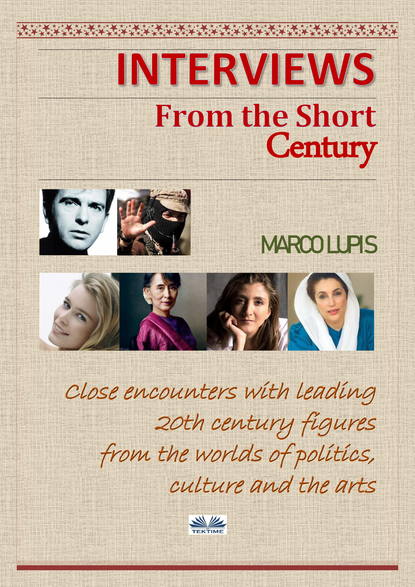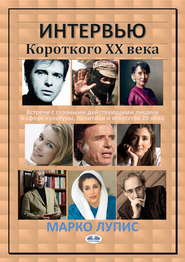По всем вопросам обращайтесь на: info@litportal.ru
(©) 2003-2024.
✖
Interviews From The Short Century
Настройки чтения
Размер шрифта
Высота строк
Поля
The stars of the film are the current cream of the crop from the âthree Chinasâ: Hong Kong (Leslie Cheung), Taiwan (Kevin Lin) and the Peopleâs Republic of China (Gong Li). The Director is an intellectual from Beijing and the producer, Hsu Feng, is a former star of Taiwanese cinema married to a businessman from Hong Kong, where she set up Tomson Films in the eighties. Indeed, it was Hsu who persuaded Chen eight years ago to bring Lilian Lee's novel, Farewell My Concubine , to the big screen.
While there is considerable hype about Chenâs latest directorial outing, what the critics and public are most excited about is the casting of the undisputed star of the film, Gong Li. The thirty-one-year-old actress is currently, without question, the most famous Chinese woman in the world. Her previous films include Red Sorghum (1987), Raise the Red Lantern (1991) and Farewell My Concubine (1993). She has just come out of an eight-year relationship with Zhang Yimou, the director who made her a global star and with whom she made her last film, Shanghai Triad , last year.
Despite Gongâs success in the West, she remains Chinese through and through.
After the dayâs filming had ended, she agreed to meet me for an exclusive interview for Panorama .
Another big film for you and another old story, this time set in 1920s China . Why do you think that is?
I think it's because China has only recently opened its doors to the rest of the world. Ever since, Chinese cinema has enjoyed greater stylistic and cultural freedom. Censorship obviously played a defining role in Chinese cinema and the topics it covered for years, but there's also a more artistic explanation, if you can call it that: many Chinese directors think itâs a good idea to make films about events that pre-date the Cultural Revolution. It's a way of revisiting those events and that era. And maybe they think it's still a bit early for an international audience to see films about recent events, which are still too fresh and painful in people's memories.
Youâre the most famous Chinese woman in the world. Do you feel the responsibility of being an ambassador?
The term ambassador scares me a little, if Iâm honest. Itâs too grand for me! Let's just say I feel that, through my films, I can be a bridge between Chinese and Western culture and history. I think it's fair to say that you guys don't know a great deal about modern China. So it gives me a great sense of pride to think that one of my films can help to educate the West about our people and the way we live our lives.
Sadly, the world's image of China in recent times is mass executions and orphanages with their âdying roomsâ. Is that really what it's like?
China has plenty of problems, there's no getting away from that. Especially if you choose to only look at the negatives and ignore the positives. If you only see one side of a country, you're not seeing the complete picture. China is a massive country with over a billion people, so there are huge differences within it. You canât just make sweeping judgements.
When did you accept the part of Ruyi in Temptress Moon ?
It was luck, really. Or maybe fate. They'd already started filming when a Taiwanese actress quit, so they offered me the part at the last minute. Did you know the Chinese critics are comparing Temptress Moon to Gone with the Wind ?
Are they? Why is that?
Itâs not because of the story; itâs the casting. Chen auditioned dozens of actresses for my role, just like several actresses were cast aside before they chose Vivien Leigh to play Scarlett O'Hara. So theyâd already begun filming when I joined the production. It's not been easy. Iâm playing a spoiled little rich girl, which is nothing like my usual roles.
This is a golden age for Chinese cinema, isn't it? You've got directors like Chen and actors like you, but there's also people like John Woo and Ang Lee making it big in Hollywood .
I think it's because Chinese directors can combine exemplary cinematography with our culture's unique charm and style.
How did you get into acting?
Completely by chance. I loved to sing when I was younger. One day, my singing teacher said I should go with him to watch a TV show being filmed in Shandong. I remember the director was a woman. When she saw me, she decided I had to have a part, so she gave me a copy of the script. It was only a small part, but she decided I was a natural. She said to my mum: âYour daughter must become an actress.â She managed to convince her, and two months later I enrolled at the Central Academy of Drama in Beijing. I studied really hard, started to get small parts and the rest, as they say, is history!
You divide your time between Beijing and Hong Kong. The papers are full of your new relationship with a Hong Kong-based businessman, so do you think you will move there permanently?
I donât think so. I like Hong Kong because itâs bustling and great for shopping. But I find it annoying. Beijing is different. People stop you in the street and talk to you about all sorts. In Hong Kong, itâs all about the money.
Are you fed up with the press sticking their noses into your private life?
I think it comes with the territory really. Itâs mainly the Asian press that often prints unpleasant or made-up stories. The papers in the West have higher standards.
Is it also important for an actress to be beautiful in China?
Do you think Iâm beautiful?
Youâre seen as a sex symbol in the West .
Thatâs really nice, but I don't feel like a sex symbol. Maybe Chinese women have a certain appeal or charm because we are so different to Western women.
What are your plans for the future?
I want to get married and have children. I think family is a really important part of a womanâs life. If you donât have a family, you canât bring experience of everyday life into your work.
And do you have any more films lined up?
Not at the moment. Iâm reading lots of scripts, but none have jumped out at me so far. Iâm not going to accept any old part just for the sake of it.
Would you consider working with a Western director?
If they had a part that was suitable for me as a Chinese woman, sure...why not?
Is there an Italian director youâd like to work with?
Absolutely: Bernardo Bertolucci!
5
Ãngrid Betancourt
The Pasionaria of the Andes
Dina, here is my article with box to follow. I hope you are well.
Today (Monday, February 11), Iâm flying from Tokyo to Buenos Aires, where I will land tomorrow (February 12). You will still be able to reach me on my satellite phone, even while Iâm navigating my away across Antarctica. Iâll be back in Argentina around February 24 and will then head to Bogotá, where I am scheduled to interview Ingrid Betancourt in early March.
Let me know if you'd be interested.
Catch up soon,
Marco
On an old computer, I found this email that I sent in early February 2002 to inform Dina Nascetti, one of my bosses at LâEspresso , of my movements. I had been in Japan to report on the tomb of Jesus
and I was preparing to embark on a long journey that would take me far away from home for nearly two months. I was headed for the end of the Earth: Antarctica.
On the way out, I planned to report on the severe economic crisis that was gripping Argentina, and on the way back, I would go via Colombia to interview Ingrid Betancourt Pulecio, the Colombian politician and human rights activist. As it turned out, I arrived in Bogotá a couple of days early, which - for me at any rate - was a stroke of luck. I interviewed Ms Betancourt on February 22, and precisely twenty-four hours later she vanished into thin air while being driven from Florencia to San Vicente del Caguán. She had been kidnapped by FARC (Revolutionary Armed Forces of Colombia) guerrillas and would be held hostage for more than six years.
If Iâd arrived in Colombia just a day later, I never would have met her.
*****
She has shoulder-length brown hair and typically Colombian dark eyes. She wears an amber bracelet on her wrist and rarely cracks a smile.
But then, Ãngrid Betancourt doesnât have many reasons to smile. She may look younger than her forty years and have an enviable petite frame, but she is running for the presidency of Colombia, the most violent country in the world, where ten people are kidnapped and seventy people murdered every single day. Where war has raged for four decades, claiming thirty-seven thousand civilian lives in the last twelve years alone. A country that boasts the dubious honour of being the worldâs leading producer of cocaine. A country from which over a million people have fled in the last three years.
And yet, it is not so long ago that this same woman sat before me today in a heavily guarded, clandestine apartment in downtown Bogotá, wearing a bulletproof vest and a nervous expression, was smiling serenely as she lay on a beach in the Seychelles, where her handsome and sophisticated French diplomat husband had been posted.






